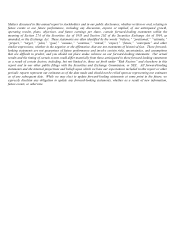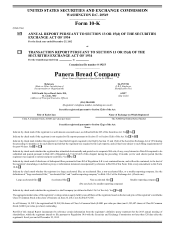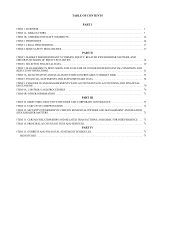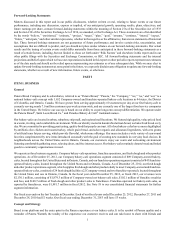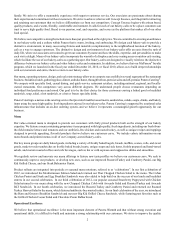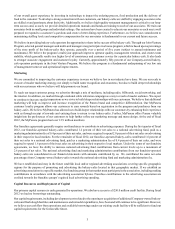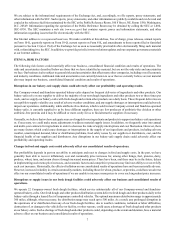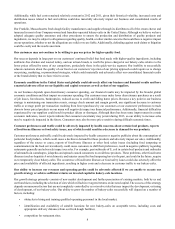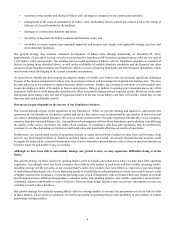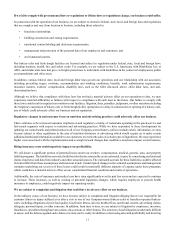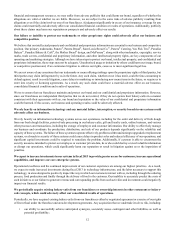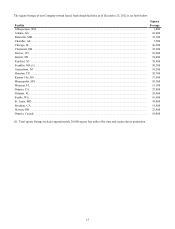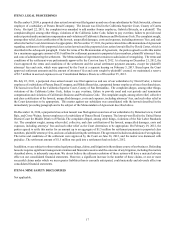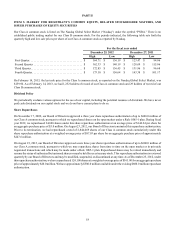Panera Bread 2012 Annual Report Download - page 16
Download and view the complete annual report
Please find page 16 of the 2012 Panera Bread annual report below. You can navigate through the pages in the report by either clicking on the pages listed below, or by using the keyword search tool below to find specific information within the annual report.8
Additionally, while fuel costs remained relatively constant in 2012 and 2011, given their historical volatility, increased costs and
distribution issues related to fuel and utilities could also materially adversely impact our business and consolidated results of
operations.
Our Franklin, Massachusetts fresh dough facility manufactures and supplies through its distributors all of the cream cheese and
tuna used in most of our Company-owned and franchise-operated bakery-cafes in the United States. Although we believe we have
adopted adequate quality assurance and other procedures to ensure the production and distribution of quality products and
ingredients, we may be subject to allegations regarding quality, health, or other similar concerns that could have a negative impact
on our operations, whether or not the allegations are valid or we are liable. Additionally, defending against such claims or litigation
could be costly and the results uncertain.
Our customers may not continue to be willing to pay our prices for higher-quality food.
Our success depends in large part on our customers' continued belief that food made with higher-quality ingredients, including
antibiotic-free chicken and roasted turkey, and our artisan breads, is worth the prices charged at our bakery-cafes relative to the
lower prices offered by some of our competitors, particularly those in the quick-service segment. Our inability to successfully
educate customers about the quality of our food or our customers’ rejection of our pricing approach could require us to change
our pricing, marketing, or promotional strategies, which could materially and adversely affect our consolidated financial results
or the brand identity that we have tried to create.
Economic conditions in the United States and globally could adversely affect our business and financial results and have
a material adverse effect on our liquidity and capital resources as well as that of our suppliers.
As our business depends upon discretionary consumer spending, our financial results may be impacted by the broader global
economic conditions and their impact on consumer spending. Our customers may make fewer discretionary purchases as a result
of job losses, foreclosures, bankruptcies, reduced access to credit and falling home prices. Because a key point in our business
strategy is maintaining our transaction counts, average check amount and margin growth, any significant decrease in customer
traffic or average profit per transaction resulting from fewer purchases by our customers or our customers' preferences to trade
down to lower priced products on our menu will negatively impact our financial performance. Additionally, financial difficulties
experienced by our suppliers could result in product delays or shortages. Although there has been some improvement in certain
economic indicators, recent reports indicate that consumer uncertainty may persist during 2013, so our ability to increase sales
may be negatively impacted in the future. Consumers may also be more price sensitive during difficult economic times.
Customer preferences and traffic could be adversely impacted by health concerns about certain food products, reports
of food-borne illnesses or food safety issues, any of which could result in a decrease in demand for our products.
Customer preferences and traffic could be adversely impacted by health concerns or negative publicity about the consumption of
particular food products, which could cause a decline in demand for those products and adversely impact our sales. Additionally,
regardless of the source or cause, reports of food-borne illnesses or other food safety issues (including food tampering or
contamination) in the food service industry could cause customers to shift their preferences, result in negative publicity regarding
restaurants generally and adversely impact our sales. For example, past outbreaks of E. coli in certain beef products and outbreaks
of salmonella in cantaloupes, jalapeños and spinach caused consumers to avoid these products. These problems, other food-borne
illnesses (such as hepatitis A or trichinosis), and injuries caused by food tampering have in the past, and could in the future, require
us to temporarily close bakery-cafes. The occurrence of food-borne illnesses or food safety issues could also adversely affect the
price and availability of affected ingredients, resulting in higher costs and a decrease in customer traffic to our bakery-cafes.
Our ability to increase our revenues and operating profits could be adversely affected if we are unable to execute our
growth strategy or achieve sufficient returns on invested capital in bakery-cafe locations.
Our growth strategy primarily consists of new market development and further penetration of existing markets, both by us and
our franchisees, including the selection of sites which will achieve targeted returns on invested capital. The success of this strategy
depends on numerous factors that are not completely controlled by us or involve risks that may impact the development, or timing
of development, of our bakery-cafes. Our ability to grow the number of bakery-cafes successfully will depend on a number of
factors, including:
• obstacles to hiring and training qualified operating personnel in the local market;
• identification and availability of suitable locations for new bakery-cafes on acceptable terms, including costs and
appropriate delivery distances from our fresh dough facilities;
• competition for restaurant sites;


